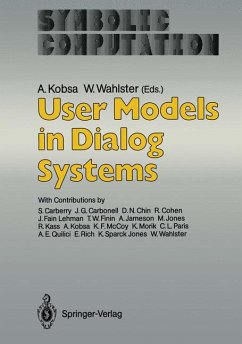User models have recently attracted much research interest in the field of artificial intelligence dialog systems. It has become evident that a flexible user-oriented dialog behavior of such systems can be realized only if the system disposes of a model of the user, containing assumptions about the user`s background knowledge as well as the user`s goals and plans in consulting the system. Research in the field of user models investigates how such assumptions can be automatically created, represented and exploited by the system in the course of an interaction with the user. This volume is the first survey pertaining to the field of user modeling. Most of the prominent international researchers in this area have contributed to this volume. Their papers are grouped into four sections: The introductory section contains a general view of the field as a whole, and a number of surveys of specific problems and techniques in user modeling. Sections two and three describe eight user modeling systems, with the focus lying on the automatic creation and exploitation of assumptions about the user respectively. The final section discusses several limits of current systems, and proposes solutions as to how some of the shortcomings might be overcome. In order to increase the quality and the coherency of the volume, each paper has been reviewed by all other contributors. Cross-references have been integrated wherever appropriate. All contributions are introduced in editorial prefaces pertaining to each section. A subject index and an extensive bibliography supplement the book.
Bitte wählen Sie Ihr Anliegen aus.
Rechnungen
Retourenschein anfordern
Bestellstatus
Storno

